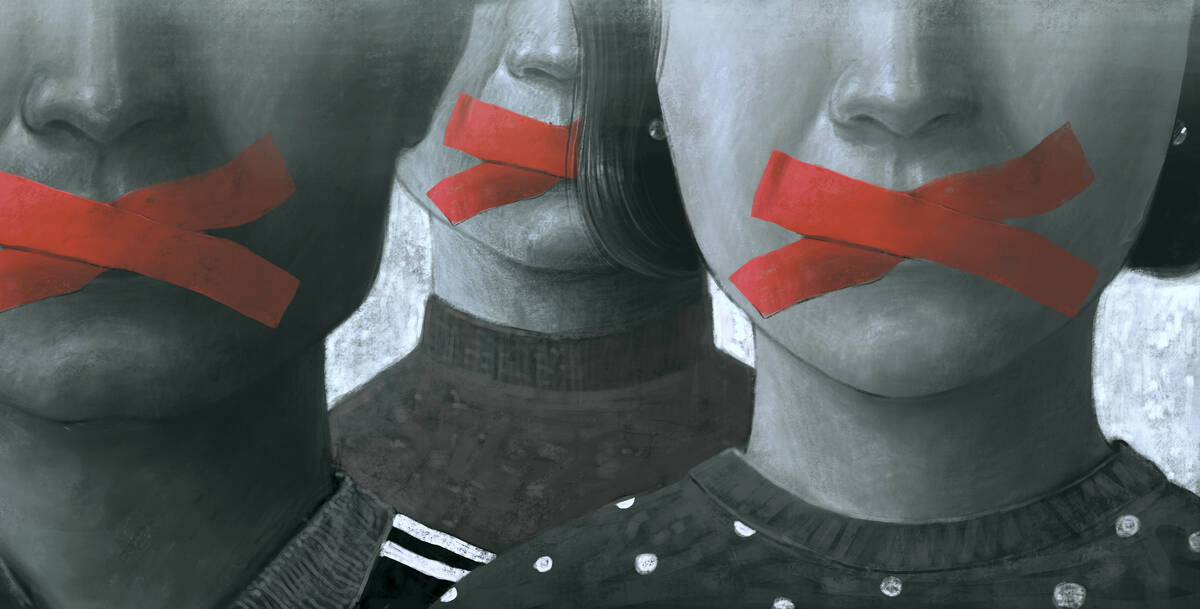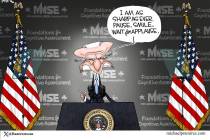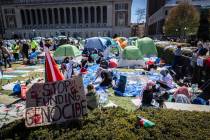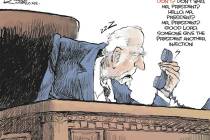COMMENTARY: Those who speak up often risk government retaliation
People have a right to criticize the government, but the courts have not yet decided if a Las Vegas police officer violated the First Amendment when he arrested four protesters in 2013 for chalking political messages on public sidewalks.
A March 8 ruling in the 9th U.S. Circuit Court of Appeals merely allows the protesters to proceed with a lawsuit against the officer, who sought immunity from civil damages. Now, after nearly a decade of legal wrangling, the protesters finally can get to the merits of their complaint in a Nevada federal court.
The protesters allege that Detective Christopher Tucker wrongfully targeted them in retaliation for anti-police speech they chalked on the sidewalks outside the Metropolitan Police Department and Regional Justice Center. Prosecutors dropped the criminal charges, which relied on a rarely enforced graffiti ordinance, and the protesters later sued.
Even if they win, the length of their case itself represents a form of punishment for speaking up against the government. As the legal maxim says: Justice delayed is justice denied.
Other forms of retaliation are common. Recent cases and briefs from the Institute for Justice, a public-interest law firm that defends the First Amendment, highlight five government tactics.
1. Selective enforcement: Small-business owner William Fambrough faced persecution when he broadcast his political views in East Cleveland, Ohio. Using a sound truck, he shared campaign messages for a candidate running against the incumbent mayor in 2021. In response, the city repeatedly sent police officers to Fambrough’s house to enforce obscure municipal ordinances never used against anyone else. The city issued noise citations and parking citations, and ultimately towed and damaged Fambrough’s truck — effectively silencing him before the election. He sued on June 8 to defend his rights.
2. Defamation lawsuits: Community activist Kelly Gallaher got hit with a defamation lawsuit when she accused the village attorney of lying in Mount Pleasant, Wisconsin. The case lacked merit and was dismissed May 24 after Gallaher fought back with a team of attorneys. Yet public officials do not need court victories to chill free speech. Simply filing litigation forces people such as Gallaher to defend themselves, which can cost tens of thousands of dollars.
3. Audits: Washington state innkeeper Robert Boule’s ordeal started with a physical confrontation. He alleges that a Border Patrol agent lifted him off the ground and threw him against an SUV while attempting to check the immigration status of Boule’s guests. When Boule filed a complaint, state and federal officers showed up and audited his hotel. The U.S. Supreme Court sanctioned the retaliation on June 8, ruling that the Border Patrol agent is entitled to blanket immunity.
4. Occupational licensing: Electrical engineer Mats Järlström fought back with math when his wife received a red-light camera ticket in Beaverton, Oregon. He crunched the numbers and determined that the formula for setting the duration of yellow lights was incomplete. But when Järlström spoke up, the state accused him of engaging in the “unlicensed practice of engineering” because he was not an Oregon-licensed professional engineer. Similar cases nationwide show how occupational licensing boards often function as censorship panels.
5. Arrest and incarceration: Retired communications professional Sylvia Gonzalez decided to give back to her community in 2019, so she ran for City Council and got elected in Castle Hills, Texas. But when Gonzalez used her position to criticize the mayor and other political insiders, they trumped up criminal charges and had her arrested, handcuffed and jailed as part of a prolonged intimidation campaign.
County attorneys refused to prosecute the case because the allegations were so far-fetched, but Gonzalez still spent a day behind bars — sitting for hours on a cold metal bench, wearing an orange jail shirt and avoiding the restroom, which had no doors.
The Las Vegas protesters eventually could win some form of relief. But government efforts to stifle speech are often successful. Correcting the abuse will require engaged judges willing to see through the government tactics and uphold the Constitution in a timely and fair manner when cases arise.
Daryl James is a writer at the Institute for Justice in Arlington, Virginia.




























